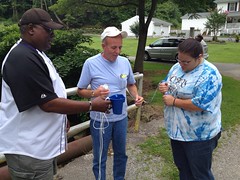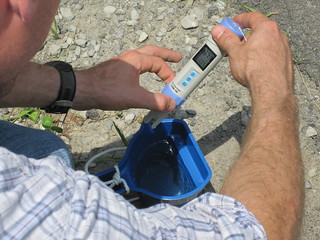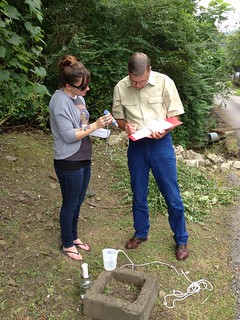Water testing workshop continues to build the case for clean water
 Over the past two months, members from around eastern Kentucky have gathered for workshops in Harlan and Floyd Counties, where they learned the basics of water testing, gained hands-on experience by testing water in nearby streams, and learned how our health is tied the health of our water.
Over the past two months, members from around eastern Kentucky have gathered for workshops in Harlan and Floyd Counties, where they learned the basics of water testing, gained hands-on experience by testing water in nearby streams, and learned how our health is tied the health of our water.
These workshops are part of the ongoing Community Science and Public Health project, which works to equip people with the skills and knowledge to gather data about the quality of our streams and to use that data to advocate for better enforcement of current laws designed to protect our land and water.
Participants learned about conductivity – what it is, why it is important, and how it is measured. Conductivity is the measure of the ability of water to conduct an electrical current and is a good indicator of a stream’s health. Common chemicals in water that conduct electrical current and cause conductivity levels to increase include ions of sodium, chloride, phosphate, nitrate, iron, sulfate, aluminum, calcium, and magnesium. In the central Appalachia region, these chemicals make their way into streams most often when naturally occurring heavy metals in mountain seams are exposed through mountaintop removal mining.
Conductivity is measured in units called microseimens (μS). The higher the level of conductivity, the less suitable the stream becomes for aquatic life. In central Appalachia, healthy streams generally have a conductivity level around 200 μS.
After reviewing the basics of water testing, participants broke into groups and headed out into the field to put what they learned into action. In Floyd County, participants tested the conductivity of the Left Fork of Middle Fork and several of its tributaries at over twenty different locations. The lowest conductivity reading was 139 μS, which was taken along Jim Potter Branch, off Route 122. The highest conductivity reading was 1,100 μS, which was along Open Fork Road, off Route 850.
The readings from Open Fork Road present an interesting study. Conductivity readings were taken from three different spots along Open Fork Road – one at the mouth of the hollow, one mid-way, and one closer to the head of the hollow. These readings were 822 μS, 844 μS, and 1100 μS, respectively. Currently, there is no active mining near Open Fork Road; however, there had been in the past. Conversely, the lowest readings taken were off Route 122, which appears to have not been mined.
At the workshop in Harlan County, participants recorded similar results. Testing was done at over twenty locations along Catrons Creek, where dozens of dead fish were recently found. Closer to the mouth of the creek conductivity was 777 μS, while near the head of the hollow where there is active mining, conductivity was 835 μS. The lowest reading was 173 μS, which was from a small tributary that flowed down from an undisturbed mountain into Catrons Creek.
Concerned about the health of water and its inhabitants, Larry Ison, a retired miner from Letcher County, said, “I've been fishing since I was a boy out of the Cumberland River. I ate the fish all my life until a couple years ago I saw a small pink dot in a fish I was cleaning. A veterinarian told me later it sounded like a tapeworm. I ain't ate fish from the river since, and I'd just like to figure out what I'm dealing with here. They are stripping and building a road right in front of my home, along the river.”
At the Floyd County workshop, member Beverly May led a discussion on how our health is tied to the health of our water and land. Recent peer-reviewed studies have shown that people living near mountaintop removal mining have higher rates of cancer and birth defects. Beverly highlighted a recent health study by Dr. Michael Hendryx which found that residents of Floyd County, Kentucky, had higher rates of cancer deaths, life-long asthma and hypertension than people living in several eastern Kentucky counties without a history of strip-mining.
Through the hands-on community water testing workshops and the Community Science and Public Health project, participants are not only learning how to test water and the importance of clean water, but they are building community with each other and their community.
“We all deserve to know what’s in our water. We’ve got to be talking to each other about our water and communities. We’ve got to be solving our problems together and sharing information,” said Clair Stines, a Harlan County chapter member and retired nurse from Loyall.
If you have concerns about the quality of water in your area and would like to get involved, the next water testing workshop will be Saturday, September 7 in Letcher County (location to be determined). These events are free and open to the public. All skill and interest levels are encouraged to attend. Registration is encouraged but not required. To register for the September 7 workshop or for more information, please visit www.kftc.org/water.
If you are unable to come to the workshop, or have questions, please contact Jessie Skaggs at [email protected] or 502-387-9616.
Recent News
Kentucky’s past legislative session showed alarming trend toward government secrecy
Churchill Downs takes more than it gives. That's why the Kentucky Derby is a no-go for me
‘We must never forget.’ Kentucky town installs markers for lynching victims.
Featured Posts
Protecting the Earth
TJC Rolling Out The Vote Tour – a KFTC Reflection Essay
KFTC Voter Empowerment Contractor Reflection Essay
Archives
- Home
- |
- Sitemap
- |
- Get Involved
- |
- Privacy Policy
- |
- Press
- |
- About
- |
- Bill Tracker
- |
- Contact
- |
- Links
- |
- RSS




Add new comment